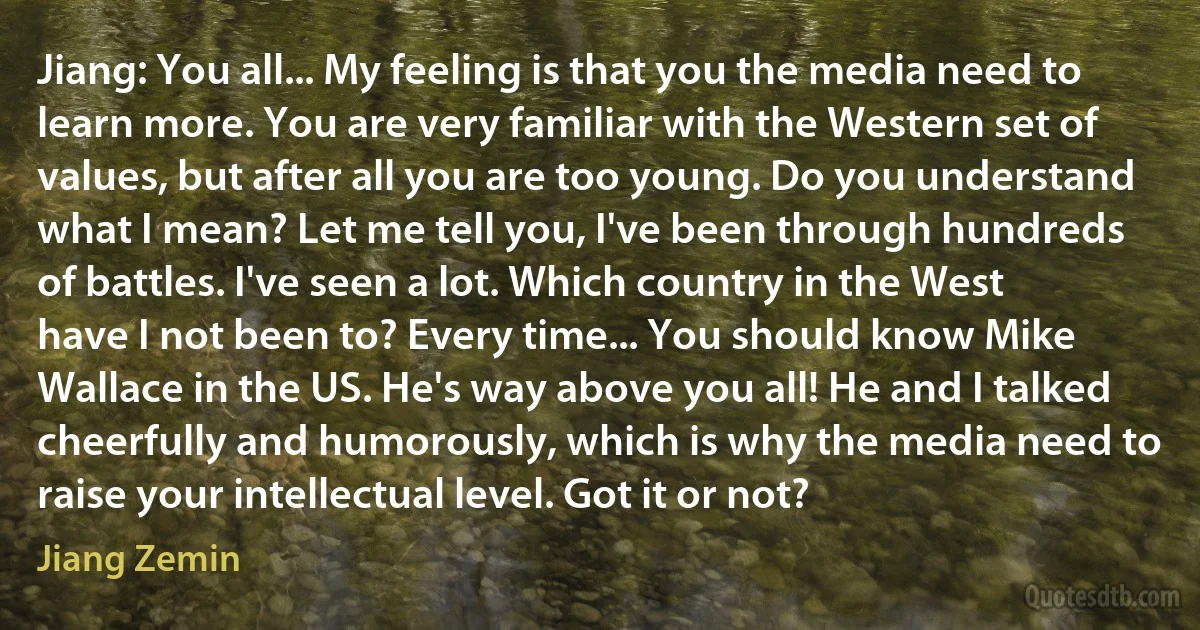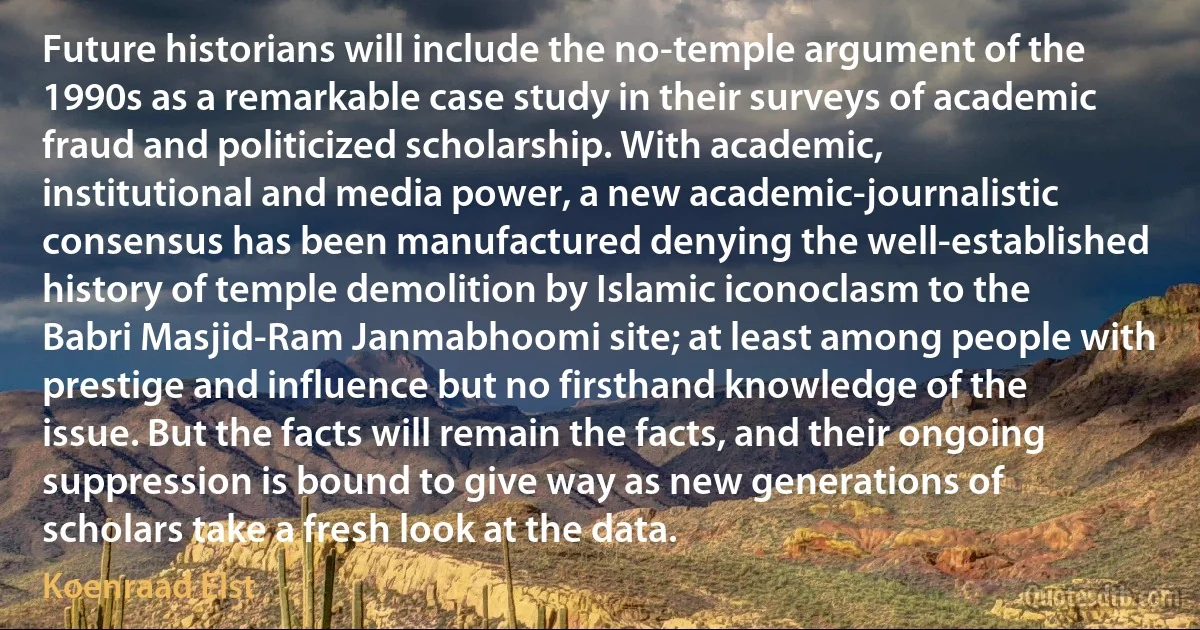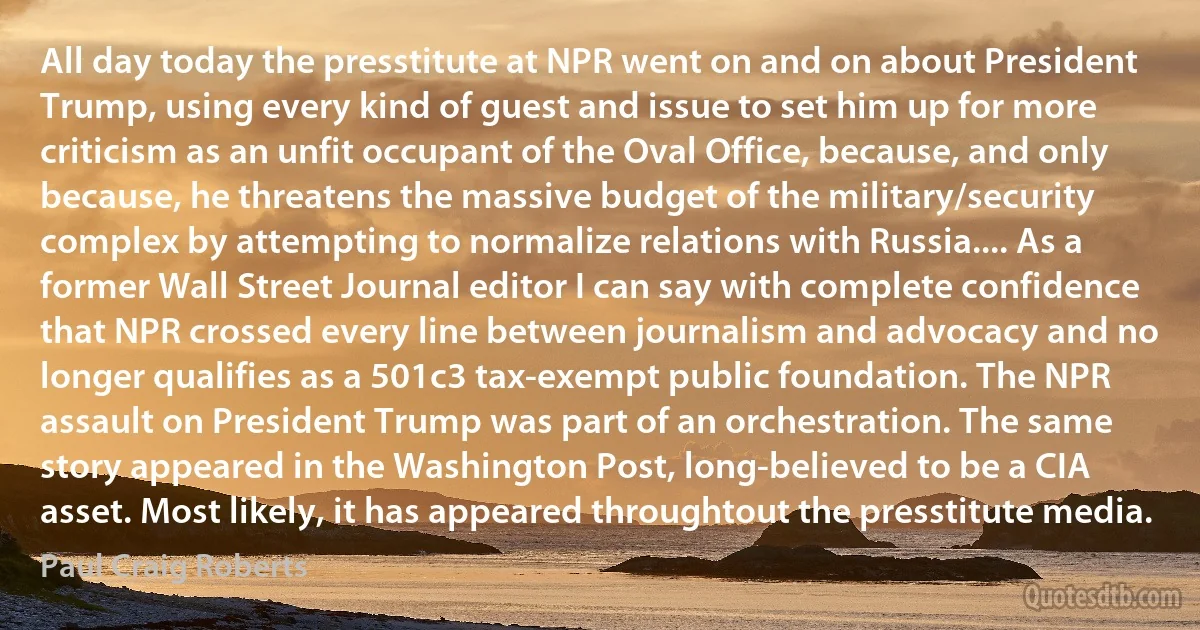Media Quotes - page 78
In relating the circumstances which have led to my confinement within this refuge for the demented, I am aware that my present position will create a natural doubt of the authenticity of my narrative. It is an unfortunate fact that the bulk of humanity is too limited in its mental vision to weigh with patience and intelligence those isolated phenomena, seen and felt only by a psychologically sensitive few, which lie outside its common experience. Men of broader intellect know that there is no sharp distinction betwixt the real and the unreal; that all things appear as they do only by virtue of the delicate individual physical and mental media through which we are made conscious of them; but the prosaic materialism of the majority condemns as madness the flashes of super-sight which penetrate the common veil of obvious empiricism.

H. P. Lovecraft
I think we have to make a very important distinction between belief and knowledge. And this is something that I think is lost these days, particularly in the news media. There's actually a difference between (and we should draw attention to it when it's transgressed) [...] what we know [and] what we're expected to believe, or told to believe.

Terry Glavin
India has its own full-fledged brand of negationism: a movement to deny the large-scale and long-term crimes against humanity committed by Islam. This movement is led by Islamic apologists and Marxist academics, and followed by all the politicians, journalists and intellectuals who call themselves secularists. In contrast to the European negationism regarding the Nazi acts of genocide, but similar to the Turkish negationism regarding the Armenian genocide, the Indian negationism regarding the terrible record of Islam is fully supported by the establishment. It has nearly full control of the media and dictates all state and government parlance concerning the communal problem (more properly to be called the Islam problem).

Koenraad Elst
Imagine the shrieks and howls in the secularists media in case of such a clear rejection of Islam's pretences, and you will understand why Hindu leaders shy away from it. But let then pause and think: is not braving the pandemonium of secularist indignation preferable to (self-) censoring the truth about Hindu society's mortal enemy? The European humanists (deists as well as atheists) who attacked the power position of Christianity, were very clear about their objective: Ecrasez l'Infame!

Koenraad Elst
A few more examples of how Western India-watchers swallow Indian secularist disinformation. The pro-Ram Janmabhoomi demonstration in Delhi on 4 April 1991 was not reported in 99% of the Western papers and electronic news channels. I have inquired among journalists about what they had received on their telexes concerning the largest-ever demonstration in the biggest democracy in the world. It turned out that these had mentioned 3 lakh demonstrators (when even the government-controlled police had given the estimate of 8 lakh), and not made the object of the demonstration clear at all. The Indian sources had deliberately blurred and minimized the information, so that the Western media had, in good faith, not deemed it worth mentioning.

Koenraad Elst
We will not change the subject and discuss the large though unknown number of Hindus killed by Christian separatists in Mizoram and Nagaland over the decades, nor the terror of Christian natives in Fiji against Hindus, the latter phenomenon... is not the target of any protest in the world media, and the first is never even mentioned, so I suppose we need not attach any undue importance to the death of Hindus at the hands of Christians.

Koenraad Elst
Numerous Hindus have been killed by Christian separatists in Nagaland and Mizoram, while the outside world believes that it is the meek Christians who are threatened and persecuted in India by the ugly fanatical Hindus because all the media coverage has been given to the killing of a few Christians in Orissa.

Koenraad Elst
However, I would like to put this criticism in perspective. The RSS and its daughter organizations do get things done. During natural disasters, RSS relief teams are always first on the scene, a fact carefully hidden from the public by the media. During the Partition, RSS workers saved the lives of Congress politicians stuck in Pakistan, often only to find that these same politicians, once safely in India, condemned "the communal forces”, meaning the RSS.... Till today, the commitment of RSS workers is such that they risk their lives for being known as Hindu activists: in some regions, Communists or Muslims regularly kill RSS workers. (Ch 9)

Koenraad Elst
There was a civil war in this country... Kennedy provoked such hostility and hatred. His death was cheered in the South because of his support for Martin Luther King. He was moving to change things on all fronts. He was starting to end the Cold War. He made a deal with Khruschev and Russia in 1962 to end the missile crisis, and he furthered the... Nuclear Test Ban Treaty in 1963. He... described the Soviets for the first time in American history as mortals, like us, who care about their children. He seemed to have an expanding vision of the world, much like Gorbachev did in Russia in the '80s... Since that day, the media has chanted the mantra that Oswald did it alone. But the American public... has never accepted it. They smell a rat.

Oliver Stone
I've got a brilliant new strategy, which is to make so many gaffes that nobody knows which one to concentrate on. They cease to be newsworthy, you completely out-general the media in that way, and they despair. You shell them, you pepper the media... you've got to pepper their positions with so many gaffes that they're confused. It's like a helicopter throwing out chaff, and then you steal on quietly and drop your depth charges wherever you want to drop them.

Boris Johnson
The shortage of public intellectuals (in the English-speaking world) goes back to the decline of the written media: the first TV intellectual was Foucault, who was at home in both media, but his successors and imitators know only the camera. This forces sound bites upon even the most complex material: see Schama, Ferguson e tutti quanti. Also, and paradoxically: public intellectuals are best when they are grounded in a particular language, culture, debate. Thus Camus was French, Habermas is German, Sen is Bengali, Orwell was deep English. This made their cross-frontier ventures plausible, in the same way that Havel or Michnik today have street cred because they started out as courageous dissidents in a very particular time and place. The opposite is the ridiculous Slavoj Zizek: a "global”' public intellectual who is therefore of no particular interest in any one place or on any one subject. If he is the future of public intellectuals, then they have no future.

Slavoj Žižek
Because of the massive media, you have massive public attention, the comedians, the late night talk shows, have a field day... The activists say... "This is what we've been waiting for"... [politicians] fumbling and grumbling and tripping over themselves trying to deal with the rat infestation, asking for the national security people... on orders of the White House... like... a foreign invasion.

Ralph Nader
The military/security complex has resurrected its Cold War enemy so necessary for its outsized budget and power and intends to keep Russia as The Enemy. The Democrats have an interest in the villification of Russia as "Russiagate” explains Hillary's loss of the 2016 Presidential election and gives Democrats hope of removing President Trump from office. The media lacks independence, knowledge, and integrity and is the tool used by the military/security complex to control explanations... As strategic and Russian studies are largely funded by the military/security complex, the universities are also complicit in the march toward nuclear war. Republicans are as dependent as Democrats on funding from the military/security complex and the Israel Lobby.

Paul Craig Roberts
American justice is a joke. It does not exist. You can see this in the American prison population. "Freedom and Democracy” America not only has the largest percentage of its population in prison than any country on the planet, but also the largest number of prisoners. If you consider that "authoritarian” China has four times the population of the United States but fewer prisoners, you understand that "authoritarian” China has a more protective rule of law than the United States. Compared to "freedom and democracy America,” Russia has hardly anyone in prison. Yet, Washington and its media whores have defined the President of Russia as "the new Hitler.”.

Paul Craig Roberts
The activists of the Earth Liberation Front and the Animal Liberation Front are merely emulating the strategies and tactics of every other social and political movement that has ever existed but with one distinct difference – they have not killed anyone. Yet environmentalists and animal rights activists have been murdered, and the media is reluctant to portray the deaths as terrorism.

Paul Watson
Watching Iris Kyle posing beside her, it was evident that Iris has no significant physique weaknesses, and her legs – particularly the calves – were much better than were Lenda's. Of course, what Iris doesn't have is Lenda's overall appeal and charisma, and since she all but refuses to do photos for magazine publicity (asking some photographers, but not getting, for as much as $1500 for a basic editorial shoot). Iris has a reputation for keeping much to herself and has certainly not become a favorite of the judges, the media or the audience. Of course, what is not her fault is that Iris suffered somewhat from the continued lack of understanding on the part of the judges as to what round one is supposed to be about. She got no first place votes in the first round and several judges placed her 3rd. She did get better scores in round two – compulsory poses – with some first place votes and only one 3rd (no doubt scored by a judge in need of Lasik surgery).

Iris Kyle



